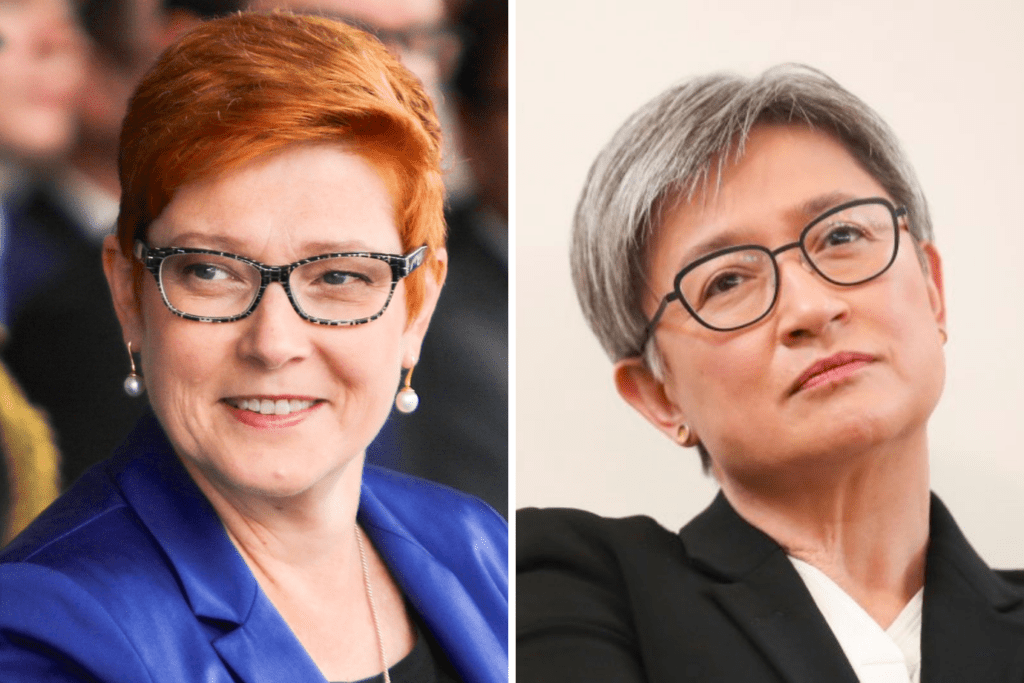Foreign Minister Marise Payne and Shadow Minister for Foreign Affairs Penny Wong will face off at the National Press Club on Friday, debating issues related to the foreign policy portfolio.
With Australia’s relationship with China, the Solomon Islands, Russia, and Ukraine top of mind for many voters at this federal election, this debate is timely and important.
Before the debate gets underway in two days’ time, here is a rundown of where both Payne and Wong have positioned themselves on the major foreign policy issues.
China and Solomon Islands
Senator Marise Payne, Foreign Minister
Just days ago, Marise Payne met with her Solomon Islands counterpart for the first time since the nation signed a contentious security pact with China last month.
The security pact is a deal that has seen China quietly secure its presence in the Indo-Pacific region, heightening fears Beijing will establish a military presence in the region. The Morrison government has been criticised for having little initial contact with the Solomon Islands before, and immediately after, its deal with China.
Marise Payne did not meet with the Solomon Islands before the security pact was signed with China, with the federal government instead sending junior Pacific Minister Zed Seselja to Honiara in a last-ditch, unsuccessful attempt to convince the Solomon Islands not to sign the deal.
In her more recent meeting with her Solomon Islands counterparty Jeremiah Manele in Brisbane, Payne confirmed she used the meeting to reaffirm the Pacific nation would not allow China to establish a military base, and that the pair agreed Australia remains the Solomon Islands’ security partner of choice.
Nevertheless, the consequences of Beijing’s security pact with the Solomon Islands are wide ranging, and have alarmed many Western countries around the world, including the United States.
Separately, back in March, Marise Payne met with China’s new ambassador to Australia, marking the first official contact between the Australian and Chinese governments in several years.
In an overview following the meeting, Payne said she “set out frankly Australia’s positions on a range of issues, including the importance of appropriate ministerial and other high level dialogue and engagement, stability in the Indo-Pacific, free and open trade, human rights and the welfare of Australians detained in China”.
Payne also said she used the meeting to encourage China to use its influence to advise Russia to end its invasion of Ukraine.
Senator Penny Wong, Shadow Foreign Minister
Following the Solomon Islands’ security pact with China, Shadow Foreign Affairs Minister Penny Wong released a statement, saying the Labor Party was “deeply concerned” about the deal and that it has serious implications for Australia and the region.
Wong reaffirmed that she believes Australia should be the partner of choice for our neighbours in the Pacific region, and that the Morrison government should explain the implications of the agreement and how it will respond.
In a press conference, she said: “This represents the worst failure for Australian foreign policy in the Pacific since the end of World War II. On Scott Morrison’s watch, our region has become less secure, and the risks Australia faces have just got greater.”
“It’s not good enough to send a junior minister at the last minute, which is what the government did, in the hope that you might change someone’s mind. It’s not good enough to be arrogantly dismissive of the concerns of Pacific Island nations on climate, and it’s not good enough to cut development assistance.”
Wong said one of the best ways Australia can deal with the strategic circumstances we face, is to secure the Pacific region. Labor’s strategy includes increasing development aid to the Pacific, establishing a new Australia-Pacific defence school, delivering an Indo-Pacific broadcasting strategy, listening to Pacific nations on climate-related issues, among other initiatives.
Ukraine
Senator Marise Payne
Following Russia’s invasion of Ukraine, Marise Payne condemned in strong terms the action, calling it a “gross violation of international law” and called on Russia to immediately withdraw its forces from Ukrainian territory.
Last week, Payne confirmed that Australia has imposed targeted financial sanctions and travel bans on a further 110 individuals, namely senior Ukrainian separatists and Russian politicians. This means that Australia has now sanctioned 812 individuals and 47 entities in response to the war.
On Monday, Payne confirmed that Australia has now officially attributed malicious cyber activity against European networks to Russia. In a statement, Payne said Australia does not tolerate activities in cyberspace that are detrimental to peace and stability.
Australia has now imposed multiple sanctions against Russia, sent lethal and non-lethal military equipment to support the defence of Ukraine, donated medical supplies and thermal coal, and increased its humanitarian assistance to the people of Ukraine, and provided visas to Ukrainian citizens.
Senator Penny Wong
In the aftermath of Russia’s invasion of Ukraine, Wong reiterated that Russia must be held to account and that the attack was “wholly unprovoked and without justification”.
“Russia alone is the aggressor, and Russia alone bears responsibility for the bloodshed and suffering that will follow,” Wong said in a joint statement with Labor leader Anthony Albanese.
“This is not just an attack on Ukraine, it is also a contemptuous attack on one of the core principles of the post-World War II order, which is that all UN members shall refrain in their international relations from the threat or use of force against the territorial integrity or political independence of any state.”
Wong said the Labor Party offers bipartisan support for sanctions imposed on Russia and Vladimir Putin. She has also said it’s important there is a coherent response from the international community that continues to impose costs on Putin and Russia for the unprovoked aggression.
She has also said that domestic bipartisanship and the unity of Australians on actions taken against Russia is important.


